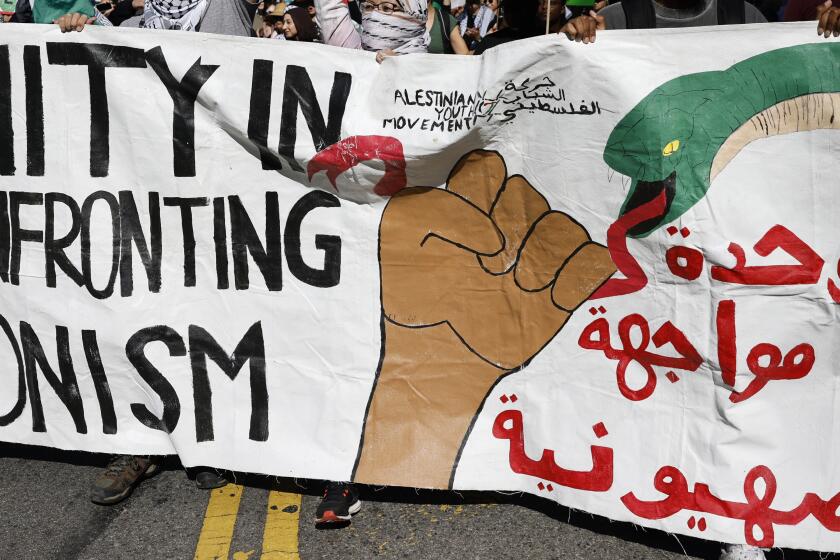Opinion: Can legitimate campus protest be distinguished from antisemitism? This guide aims to help

- Share via
After one of the most tumultuous years in the modern history of the university, this new academic year brings a sense of trepidation and even dread for students, staff, faculty and administrators. What was so trying about the past year was the unraveling of the compact that binds the people who attend and work at a university into a community.
The rupture began on Oct. 7, the day of Hamas’ staggering massacre of Israeli civilians. Some students and faculty members at colleges across the country expressed support for the attack or refused to condemn it, leaving many Jews on campus feeling deeply vulnerable. Then, as the Israeli military campaign began to produce thousands of casualties in Gaza, growing campus protests expressed strong support for the Palestinian victims. Many of the protesters (though, sadly, not all) were animated not by solidarity with Hamas but by support for the Palestinian cause and sincere concern about the loss of innocent lives.
As we witnessed at UCLA and USC, campus life became tense and fraught. Relations frayed, and openness to differing perspectives evaporated. Administrators, caught off guard, lurched from crisis to crisis.
The Anti-Defamation League’s allegations against Occidental College and Pomona College suggest it’s adrift from its mission amid protests over the war in Gaza.
What can administrators and public officials do to prevent a repeat? We need a better way of determining what is antisemitic and what is not in the context of mass protests over Israel. That’s the question a group of scholars with the Nexus Project, including us, took up recently. The result is a new “Campus Guide to Identifying Antisemitism in a Time of Perplexity.”
The guide assumes both that antisemitism is a real problem in our society and that not all harsh criticism of Israel is antisemitic. Indeed, political speech may be painful or offensive to people who identify strongly with Israel without being antisemitic.
Lamentably, there were expressions of antisemitism and ostracism on campuses last year that created a feeling of discomfort among Jewish students, staff and faculty members, particularly those who strongly support Israel. Antisemitism must be condemned at every turn.
College officials may fear being perceived as taking sides in the Israel-Hamas conflict, but it is wrong to confuse condemning antisemitism with ignoring the plight of the Palestinians.
And yet it would be simplistic to reduce the protests to a malevolent, antisemitic campaign. Just as Jewish students have felt attacked for supporting Israel, so too have students who support the pro-Palestine movement felt attacked for their views. They faced hostility from right-wing, pro-Israel counter-demonstrators, a deaf ear from university leaders and often violent responses from law enforcement. Moreover, they were frequently accused of being antisemitic because of their support for Palestinians and criticism of Israel even though a noticeable contingent of Jews participated in the protests.
So how can one tell whether criticism of Israel is antisemitic or not? The guide proposes a series of framing questions to help make that determination. First, does the criticism rely on traditional antisemitic stereotypes such as the notion that Jews are greedy or intent on global domination? Second, does it promote discrimination, violence and hostility against Jews simply because they are Jewish? And third, does it conflate Jews with Israelis — for example, by holding all Jews responsible for the actions of the state of Israel or presuming that Jews support all of Israel’s actions unless proven otherwise?
The guide uses these questions to assess some of the terms and slogans commonly used in the protests, including “From the river to the sea,” “intifada,” “apartheid,” “genocide” and “By any means necessary.” Are they antisemitic? The simplest answer is that it depends. But the baseline assumption should not be that these words and phrases are antisemitic unless and until it can be established that they are accompanied by anti-Jewish stereotypes, animus against Jews as Jews, or conflation of Jews and Israelis.
For example, the guide maintains that the phrase “From the river to the sea” is not antisemitic if it’s proposing a single state in which all citizens, Jewish and Palestinian, have equal rights. By contrast, if the phrase is a call to eliminate Jews from the land between the Jordan and the Mediterranean or to relegate them to second-class status, it is antisemitic.
Admittedly, it is deeply challenging to determine intent in speech. In the absence of proof, however, one cannot assume that a speaker intended the more malign interpretation of a slogan. One way to find out is to do something we have gotten out of the habit of doing: ask the person voicing the slogan to tell you what they mean. That kind of interaction is key to rebuilding our muscle to talk across difference.
Similarly, “apartheid” is a legal term that is offensive to the ears of many Jews when applied to Israel, and one can vehemently dispute its applicability. But if it is not linked to traditional anti-Jewish tropes, it is not on its face antisemitic.
These distinctions are needed to help restore the nuance to campus debates that has been lost over the years. They can also provide essential guidance for university administrators, who feel called upon to take sides and often struggle to differentiate between legitimate political speech and antisemitic expression.
To recapture the trust that has been eroded over the past year, we must focus on listening to different viewpoints, and trying to understand them, rather than rushing to judgment. We can start by adopting a new and careful way of distinguishing antisemitism from political speech that may be unsettling to some but is not at its core antisemitic.
David N. Myers is distinguished professor of Jewish history at UCLA. Nomi M. Stolzenberg is a professor at USC’s Gould School of Law.
More to Read
A cure for the common opinion
Get thought-provoking perspectives with our weekly newsletter.
You may occasionally receive promotional content from the Los Angeles Times.












